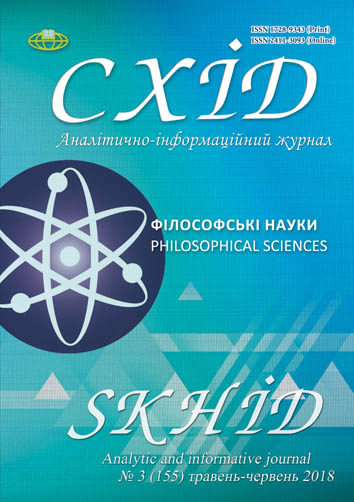The concept of "Russian World" as a demonstration of symphony religion and power
DOI:
https://doi.org/10.21847/1728-9343.2018.3(155).139834Keywords:
"Russian world", a symphony of religion and power, Patriarch Kirill, political orthodoxy, Russian Orthodox ChurchAbstract
The article is devoted to the concept of "Russian World" as one of the main manifestations of symphony religion and power in modern Russian Orthodoxy. It is proved that the religious-political construct of "symphony of spiritual and secular authority" in political Orthodoxy is perceived as a modern interpretation of the Byzantine principle of interaction between church and state; for the consolidation of the "Russian world" status Orthodox outpost in the struggle with the West, it is widely used medieval apologists ideological narratives, like "Moscow - Third Rome"; trying to construct a virtual ideological confrontation with the imaginary "non-spiritual West" and political Orthodoxy, his supporters are actively using the ideological clich? "siege fortress", which remained the legacy of the persecuted Orthodox Church of the Soviet era. It is traced that the process of the emergence and formation in the Russian religious discourse of the phenomenon of political orthodoxy chronologically coincides with the sharp change in the political course of the Russian Federation in the 90 years of the twentieth century and the political and social request for a "strong leader". It is analyzed that in the new political realities the active collaboration between the church and the state began, which became the key to the formation of new ideological constructs. It was investigated that the ideological doctrine of the "Russian world", the main apologist of which is the Patriarch of Moscow Kirill (Gundyayev), is a typical postmodernist construct, in which a number of separate elements of several ideological paradigms are used. The concept of the "Russian world" is based on mythological thinking, the Russian imperial pathos, which is designed in the form of a narrative about a "separate civilization", and elements of Orthodox fundamentalism, which are actualized in opposition to Russia and Orthodoxy to the outside world.
Downloads
References
Verkhovskii, А. 2003. Political Orthodoxy: Russian Orthodox nationalists and fundamentalists, 1995 - 2001. SОVА,Moscow, 316 p. (rus).
Address by His Holiness Patriarch Kirill at the opening ceremony of the Third Assembly of the Russian World. 11.03.2009. Official site of the Moscow Patriarchate. Available at: http://www.patriarchia.ru/db/text/928446.html (Accessed: 08.05.2018).
Grigulevich,I.R. 1981. Papacy. Century XX. Politizdat,Moscow, 532 p. (rus).
Vice-chairman DECR: "The Russian world is a civilizational community, formed by common values and common experience of social construction". 2010. Official site of the Moscow Patriarchate. Available at: http://www.patriarchia.ru/db/text/26208.html (Accessed: 14.05.2018).
Kolodin, А. 2011. Islamic fundamentalism. Culture of faith. Guide doubters. Available at: http://religiocivilis.ru/islam/islami/297-islamskii-fundamentalizm.html?start=1 (Accessed: 11.05.2018).
Kolotvin, S. 2010. Principles of the construction of the Christological system of St. Emperor Justinian the Great. Bogoslov.ru. Available at: http://www.bogoslov.ru/text/1001866.html (Accessed: 01.05.2018).
The Concordat of 1933. Historical Encyclopedia. Available at: http://www.hrono.ru/organ/ukaz_k/1933konkordat.php (Accessed: 13.11.2017).
Lotov, D. 2011. The LutheranChurchand the Third Reich. Community of the st. Peter and Paul in Moscow. Available at: http://www.peterpaul.ru/1505 (Accessed: 18.04.2018).
Liubin, V. 2007. Nazism. The Catholic Encyclopaedia of M-P. Moscow: The Franciscan Publishers: 740 - 745 (rus).
Metropolitan Kirill commented on the question of a new interpretation of canonical rules by the Patriarchate of Constantinople. 06.24.2008. Official site of the Moscow Patriarchate. Available at: http://www.patriarchia.ru/db/text/427219.html (Accessed: 08.05.2018).
Pius XI. 1937. Mit brennender Sorge. About the Church and the German Reich. Una Voce Russia. Available at: http://www.unavoce.ru/library/-mit_brennender_sorge.html (Accessed: 06.08.2017).
His Holiness Patriarch Kirill: The Russian world is a special civilization that must be saved. 09.08.2014. Official site of the Moscow Patriarchate. Available at: http://www.patriarchia.ru/db/text/3730705.html (Accessed: 03.03.2018).
Smith, D. M. 1995. Mussolini. Inter Digest,Moscow: 384 p. (rus)
Тishkov, V. А. 2008. Russian world: meanings and strategies. Ethnic and religious diversity is the basis for the stability and development of Russian society. Moscow Bureau for Human Rights,Moscow: 55-70 (rus).
Florovsky, G. Empire and desert. Antinomies of Christian history. Yakov Krotov's Library. Available at: http://www.krotov.info/library/21_f/-lo/rovsky_007.html (Accessed: 13.05.2018).
Churchand state. Social concept of the ROC. 2008. ROC DECR. Available at: https://mospat.ru/ru/documents/social-concepts/iii/ (Accessed: 15.01.2018).
Chornomorets, Yu. 2011. The Christian conservatism of Patriarch Bartholomew and the fundamentalism of Patriarch Kirill: significant contradictions and threats. RІSU. Available at: http://risu.org.ua/ua/index/-expert_thought/analytic/40214/ (Accessed: 10.03.2018).
Ecumenical Patriarch Bartholomew Denounces Moscow's "3rd Rome". 2004. Orthodoxos Typos. Available at: http://kiev-orthodox.org/site/english/915/ (Accessed: 10.03.2018).
Downloads
Published
How to Cite
Issue
Section
License
Copyright (c) 2018 Anton Fomenko

This work is licensed under a Creative Commons Attribution-NonCommercial-NoDerivatives 4.0 International License.
1. Authors bear responsibility for the accuracy of facts, quotations, numbers and names used.
2. Manuscripts are not sent back.
3. The publisher does not always agree with the authors' opinion.
4. The authors reserve the right to authorship of the work and pass the first publication right of this work to the journal under the terms of a Creative Commons Attribution-NonCommercial-NoDerivatives 4.0 International License. This license allows others to distribute (copy) the published work for non-commercial purposes, provided there is mandatory attribution to its authors and a link to the first publication in our journal.
5. The authors have the right to conclude separate supplement agreements that relate to non-exclusive work distribution in the form in which it has been published by the journal (for example, to upload the work to the online storage of the journal or publish it as part of a monograph), provided that the reference to the first publication of the work in this journal is included.

